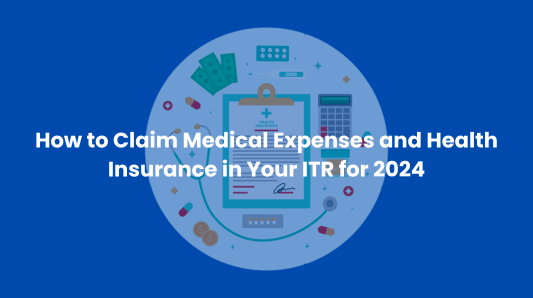
How to Claim Medical Expenses and Health Insurance in Your ITR for 2024
As the financial year comes to a close, it’s essential to understand how you can maximize your tax benefits by claiming medical expenses and health insurance in your Income Tax Return (ITR). This guide will walk you through the deductions available under Section 80D and 80DD, how to report medical reimbursements and preventive health check-ups, and tips for maximizing health-related tax benefits.
Deductions Available Under Section 80D
Section 80D of the Income Tax Act allows taxpayers to claim deductions on premiums paid for health insurance policies. Here’s how you can benefit:
Self, Spouse, and Children:
- You can claim up to ₹25,000 per year for premiums paid for yourself, your spouse, and your dependent children.
- If you or your spouse is a senior citizen (aged 60 years or above), the deduction limit increases to ₹50,000.
Parents:
- For premiums paid for your parents, you can claim an additional deduction of ₹25,000.
- If your parents are senior citizens, this limit increases to ₹50,000.
Preventive Health Check-Ups:
- Within the overall limit, you can claim up to ₹5,000 for preventive health check-ups. This is included in the total deduction limits mentioned above.
Example Calculation
If you are paying ₹30,000 for a health insurance policy for yourself and ₹40,000 for your senior citizen parents, your total deduction under Section 80D would be:
- ₹25,000 (self)
- ₹40,000 (parents)
- Total: ₹65,000
Deductions Available Under Section 80DD
Section 80DD provides deductions for medical treatment, training, and rehabilitation of a dependent with a disability. The key points are:
Fixed Deduction Amounts:
- For a dependent with 40% to 80% disability, you can claim a fixed deduction of ₹75,000.
- For a dependent with more than 80% disability, the deduction is ₹1,25,000.
Eligible Expenses:
- Medical treatment (including nursing), training, and rehabilitation expenses.
- Premiums paid for policies specifically for the maintenance of the dependent.
Example Calculation
If you incur ₹90,000 for the treatment of a dependent with severe disability, you can claim ₹1,25,000 under Section 80DD.
Reporting Medical Reimbursements and Preventive Health Check-Ups
When filing your ITR, ensure you accurately report medical reimbursements and preventive health check-ups:
Medical Reimbursements:
- Report any reimbursements received from your employer separately.
- Only the amount exceeding ₹15,000 per annum (if provided by the employer) is taxable.
Preventive Health Check-Ups:
- Maintain receipts and documents for preventive health check-ups.
- The maximum amount claimable is ₹5,000, and it is part of the overall Section 80D limit.
Maximizing Health-Related Tax Benefits
To make the most of health-related tax benefits, consider the following tips:
- Comprehensive Coverage: Opt for a comprehensive health insurance policy covering all family members, including senior citizen parents.
- Document Maintenance: Keep detailed records and receipts of all medical expenses, health insurance premiums, and preventive health check-up costs.
- Regular Health Check-Ups: Take advantage of the ₹5,000 preventive health check-up deduction each year to stay healthy and reduce taxable income.
- Plan for Parents: If your parents are senior citizens, ensure to include their health insurance premiums in your Section 80D deductions.
- Utilize Section 80DD: If you have a dependent with a disability, make sure to claim the deductions available under Section 80DD.
By understanding and utilizing these deductions, you can significantly reduce your taxable income and increase your tax savings. For personalized advice and assistance in filing your ITR, visit cavaibhavchavan.com.
If you need expert help, don’t hesitate to contact Vaibhav Chavan today and ensure your tax filing is accurate and beneficial!